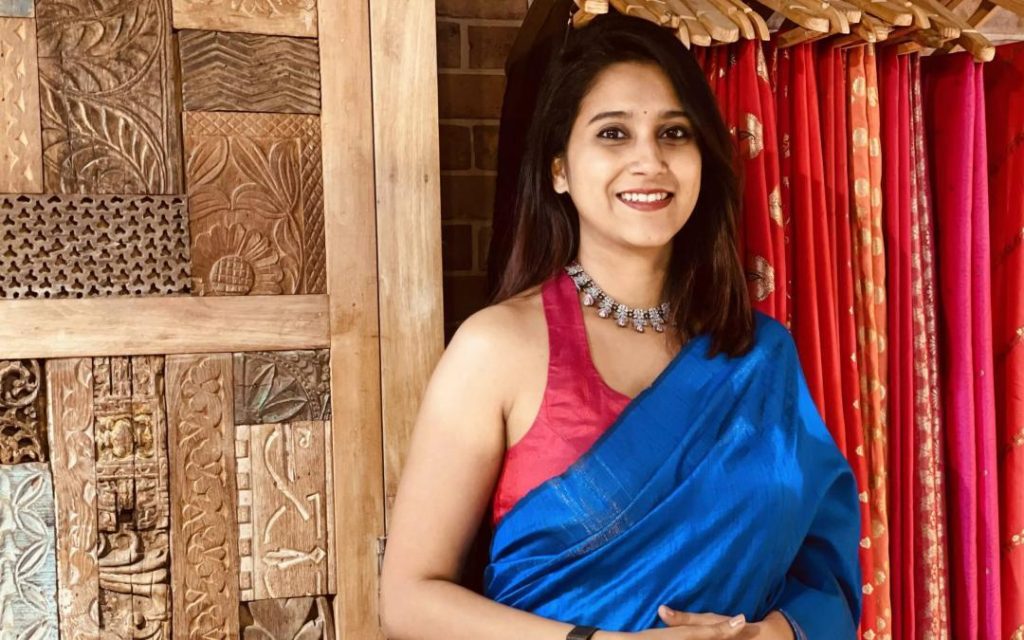
Karagiri Revives Handloom Heritage, Empowers 1,800 Rural Weavers
In a world dominated by mass-produced, machine-made fabrics, Karagiri is a beacon of hope for India’s rich handloom heritage. Founded by Pallavi Mohadikar, Karagiri is a purpose-driven saree brand that has managed to revive the dying art of traditional weaving by empowering over 1,800 rural weavers across the country.
Pallavi’s journey began during her student days when she started selling Chikankaris, a traditional handloom fabric from Uttar Pradesh, online. What started as a small experiment quickly turned into a passion project, and Karagiri was born. Today, the brand has become a household name, synonymous with high-quality, heritage sarees that not only adorn the bodies of women but also carry the stories and struggles of the rural weavers who created them.
Karagiri’s success story is built on three pillars: storytelling, fair trade, and digital-first strategies. Pallavi believes that every saree has a story to tell, and she has made it her mission to share these stories with the world. From the intricate designs to the colors used, every saree is a testament to the skill and craftsmanship of the rural weavers who created it.
To ensure that these weavers receive a fair deal for their work, Karagiri has implemented a fair trade policy that guarantees them a minimum price for their products. This not only helps them earn a steady income but also gives them the confidence to continue practicing their craft. As a result, Karagiri has become a beacon of hope for rural weavers, providing them with a platform to showcase their skills and earn a livelihood.
Karagiri’s digital-first strategy has been instrumental in taking the brand global. With a strong online presence, Karagiri has been able to connect with customers from all over the world, showcasing the beauty of Indian handloom heritage. The brand’s e-commerce platform is designed to provide customers with a seamless shopping experience, with detailed product descriptions, high-quality images, and easy returns.
But Karagiri’s impact goes beyond just selling sarees. The brand has become a catalyst for change, empowering rural weavers to take control of their lives and their livelihoods. By providing them with a platform to showcase their skills, Karagiri has helped to restore pride and dignity to these communities.
In a country where the handloom industry is often seen as a dying art, Karagiri is a breath of fresh air. The brand’s commitment to fair trade and storytelling has not only helped to revive the industry but also provided a platform for rural weavers to showcase their skills to a global audience.
Pallavi’s journey with Karagiri has not been without its challenges. She has faced skepticism and doubts from many, who questioned the viability of a handloom brand in a world dominated by machine-made fabrics. But Pallavi’s passion and dedication have paid off, and Karagiri is now a respected brand in the industry.
As Karagiri continues to grow and expand, Pallavi remains committed to her core values of fair trade, storytelling, and digital innovation. She believes that every saree has the power to tell a story, and she is determined to share those stories with the world.
The Karagiri Story
Pallavi’s journey with Karagiri began in 2015, when she started selling Chikankaris online as a student. What started as a small experiment quickly turned into a passion project, and Karagiri was born. Today, the brand has become a household name, synonymous with high-quality, heritage sarees.
Karagiri’s success story is built on three pillars: storytelling, fair trade, and digital-first strategies. Pallavi believes that every saree has a story to tell, and she has made it her mission to share those stories with the world.
From the intricate designs to the colors used, every saree is a testament to the skill and craftsmanship of the rural weavers who created it. Karagiri’s fair trade policy guarantees these weavers a minimum price for their products, providing them with a steady income and the confidence to continue practicing their craft.
Karagiri’s digital-first strategy has been instrumental in taking the brand global. With a strong online presence, Karagiri has been able to connect with customers from all over the world, showcasing the beauty of Indian handloom heritage.
The Impact of Karagiri
Karagiri’s impact goes beyond just selling sarees. The brand has become a catalyst for change, empowering rural weavers to take control of their lives and their livelihoods. By providing them with a platform to showcase their skills, Karagiri has helped to restore pride and dignity to these communities.
In a country where the handloom industry is often seen as a dying art, Karagiri is a breath of fresh air. The brand’s commitment to fair trade and storytelling has not only helped to revive the industry but also provided a platform for rural weavers to showcase their skills to a global audience.
Conclusion
Karagiri’s story is a testament to the power of innovation and community-driven entrepreneurship. By combining storytelling, fair trade, and digital-first strategies, Pallavi has managed to revive India’s handloom heritage and empower over 1,800 rural weavers.
As Karagiri continues to grow and expand, Pallavi remains committed to her core values of fair trade, storytelling, and digital innovation. She believes that every saree has the power to tell a story, and she is determined to share those stories with the world.
Source:
https://ascendants.in/the-ascendants/karagiri-indias-heritage-to-world/






